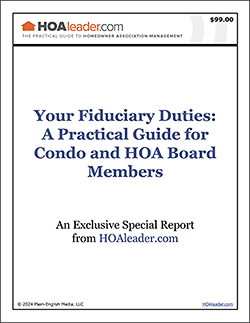Thank you for taking on a leadership role in your condo or HOA. It's a big job that has the potential to truly benefit your community. And it carries a lot of responsibilities—including legal
responsibilities.
The biggest of these is to fulfill the fiduciary duties you're required to meet as you carry out your role as president, secretary, treasurer, a vice president, or a director at large.
Why is this so important?
Because you're at personal financial risk—we'll say that again to be sure it sinks in: your personal wealth, that you've worked hard to build, is at stake—if you ignore them. Fulfill them, and that personal risk evaporates. It's that simple.
In this report, you'll find these robust and information-packed articles:
- What Exactly Is Your Fiduciary Duty as a Condo/HOA Board Member or Officer?
- Understanding the Business Judgment Rule and Other Protections for Condo/HOA Leaders
- What Is a Condo/HOA Conflict of Interest (It's more challenging to define than it might seem!)
- 6 Common Conflicts of Interest for Condo/HOA Leaders and How to Fix Them
- Peace of Mind: Be Sure Your Condo/HOA Has Insurance Covering You as a
Leader
- Tips to Protect Against Personal Liability While You Serve on Your Condo/HOA Board
- Does the Business Judgment Rule Apply to Community Associations?
- The Best Advice
for Future Condo/HOA Board Members from 7 Board Experts
- The Facts on What HOA/Condo Board Presidents Can and Can't Do
- Does a Condo/HOA Board President Vote on Issues Before the Board?
- What's Abstention, When Should It Be Done, and How Do You Count It?
- 7 Common Condo/HOA Terms and Concepts That Are Often Misunderstood
- When You Can Serve In More Than One Condo/HOA Officer Position—And Why You Should Avoid It
- 7 Scenarios: Are You an HOA Board Member or an Owner? Or Both?
- What Confidentiality Means for Condo/HOA Board Members and Officers
- What to Do When a Condo/HOA Board Member Breaches the
Duty of Confidentiality
Best regards,
Matt Humphrey
President

